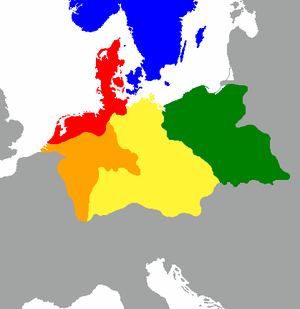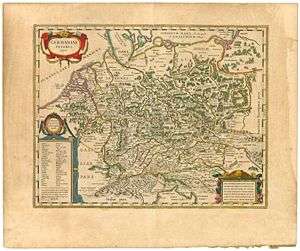Ingaevones

The Ingaevones or, as Pliny has it, apparently more accurately, Ingvaeones ("people of Yngvi"), as described in Tacitus's Germania, written c. 98 CE, were a West Germanic cultural group living along the North Sea coast in the areas of Jutland, Holstein, Frisia and the Danish islands, where they had by the 1st century BCE become further differentiated to a foreigner's eye into the Frisii, Saxons, Jutes and Angles. The postulated common group of closely related dialects of the Ingvaeones is called Ingvaeonic or North Sea Germanic.[1]
Tacitus' source categorized the Ingaevones near the ocean as one of the three tribal groups descended from the three sons of Mannus, son of Tuisto, progenitor of all the Germanic peoples, the other two being the Irminones and the Istaevones. According to the speculations of Rafael von Uslar, this threefold subdivision of the West Germanic tribes corresponds to archeological evidence from Late Antiquity.
Pliny ca 80 CE in his Natural History (IV.28) lists the Ingvaeones as one of the five Germanic races, the others being the Vandili, the Istvaeones, the Hermiones and the Bastarnae. According to him, the Ingvaeones were made up of Cimbri, Teutons, and Chauci. Stripped of its Latin ending, the Ingvaeon are the Ingwine, "friends of Ing" familiar from Beowulf, where Hrothgar is "Lord of the Ingwine"—whether one of them or lord over them being ambiguous.

Ing, the legendary father of the Ingaevones/Ingvaeones derives his name from a posited proto-Germanic *Ingwaz, signifying "man" and "son of",[2] as Ing, Ingo, or Inguio, son of Mannus. This is also the name applied to the Viking era deity Freyr, known in Sweden as Yngvi-Freyr[3] and mentioned as Yngvi-Freyr in Snorri Sturluson's[4] Ynglinga saga. Jacob Grimm, in his Teutonic Mythology considers this Ing to have been originally identical to the obscure Scandinavian Yngvi, eponymous ancestor of the Swedish royal house of the Ynglinga, the "Inglings" or sons of Ing. Ing appears in the set of verses composed about the 9th century and printed under the title The Old English Rune Poem by George Hickes in 1705:[5]
- Ing wæs ærest mid Est-Denum
- Gesewen secgum, oþ he siððan est
- Ofer wæg gewat; wæn æfter ran;
- Þus heardingas þone hæle nemdun.[6]
An Ingui is also listed in the Anglo-Saxon royal house of Bernicia[7] and was probably once seen as the progenitor of all Anglian kings.[8] Since the Ingaevones form the bulk of the Anglo-Saxon settlement in Britain, they were speculated by Noah Webster to have given England its name,[9] and Grigsby remarks that on the continent "they formed part of the confederacy known as the 'friends of Ing' and in the new lands they migrated to in the 5th and 6th centuries. In time they would name these lands Angle-land, and it is tempting to speculate that the word Angle was derived from, or thought of as a pun on, the name of Ing."[8]
According to the Trojan genealogy of Nennius in the Historia Brittonum, Mannus becomes "Alanus" and Ing, his son, becomes Neugio. The three sons of Neugio are named Boganus, Vandalus, and Saxo—from whom came the peoples of the Bogari, the Vandals, and the Saxons and Thuringii.
See also
Notes
- ↑ Sonderegger, Stefan (1979). Grundzüge deutscher Sprachgeschichte. Diachronie des Sprachsystems, vol. I: Einführung – Genealogie – Konstanten. Berlin/New York: Walter de Gruyter; Ingerid Dal, "2.1: Altniderdeutsch u. seine Vorstufen" in Gerhard Cordes, Dieter Möhn, eds. Handbuch zur Niederdeutschen Sprach und Literaturwissenschaft.1983.
- ↑ Compare the suffix -ing meaning "tribe, house", as in Scylfings, et al.
- ↑ For Ing as an aspect of Freyr, see R. North, Heathen Gods in Old English Literature (Cambridge) 1997.
- ↑ Noted by John Grigsby, Beowulf & Grendel (London: Watkins) 2005:98 note 6.
- ↑ Hickes, Thesaurus of the Old Languages of the North, 1705, noted by Grigsby 2005:98.
- ↑ John Grigsby provides the translation "Ing was among the East Danes first seen among men, til he departed [east? back?] over the sea; the wagon ran after; thus the hard-men [warriors?] named the hero." Grigsby notes the return journey in a wagon over the sea of this obliquely referred-to god: " the presence of this deity might have been allowed to remain in the otherwise Christian poem on the grounds that by this rime Ing was regarded (as in some Anglian genealogies) as a great continental ancestor" (Grigsby 2005:99).
- ↑ R. North 1997:42f.
- 1 2 Grigsby 2005:99.
- ↑ Webster, Noah. Letters to a Young Gentleman Commencing His Education. S. Converse, 1823:105.
References
- Grimm, Jacob (1835). Deutsche Mythologie (German Mythology); From English released version Grimm's Teutonic Mythology (1888); Available online by Northvegr 2004-2007:Chapter 15, page 2-; 3. File retrieved 09-26-2007.
- (German) Sonderegger, Stefan (1979): Grundzüge deutscher Sprachgeschichte. Diachronie des Sprachsystems. Band I: Einführung – Genealogie – Konstanten. Berlin/New York: Walter de Gruyter. ISBN 3-11-003570-7
- Tacitus. Germania (1st century AD). (in Latin)